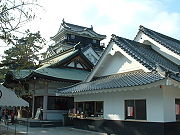
Battle of Azukizaka (1564)
Encyclopedia
The or took place in 1564, when Matsudaira Motoyasu (later renamed Tokugawa Ieyasu
), sought to destroy the growing threat of the Ikkō-ikki
, a league of monks, samurai and peasants who were strongly against samurai rule.
Tensions between warriors and the Ikki had been escalating in Mikawa as the Ikki resisted samurai efforts to tax their temples. Fighting broke out in 1563 when Suganuma Sada, a Matsudaira retainer entered the Jōgūji temple in Okazaki, and confiscated its rice to feed his own men. In retaliation the monks attacked Suganuma's castle and retrieved the rice back to Jōgūji where they barricaded themselves. When Motoyasu sent messengers to their temple to investigate the disorder they were executed. In another incident, Ikki samurai attacked a merchant in the temple town of Honshōji. Motoyasu launched a raid against the temple but was defeated.
 The battle of Azukizaka was fought on January 15, 1564. Motoyasu had decided to concentrate his forces in eliminating the Ikki from Mikawa and had seek the help of warrior monks from the temple of Daijuji whom which he enjoyed good relations. In the Ikki ranks where some of Motoyasu's vassals, like Honda Masanobu
The battle of Azukizaka was fought on January 15, 1564. Motoyasu had decided to concentrate his forces in eliminating the Ikki from Mikawa and had seek the help of warrior monks from the temple of Daijuji whom which he enjoyed good relations. In the Ikki ranks where some of Motoyasu's vassals, like Honda Masanobu
, who had turned over to the Ikki rebellion on religious sympathy. The battle was fierce and Motoyasu took the field personally, issuing challenges to enemy samurai and fighting in the front line where he received bullets that pierced his armour but failed to wound him. Motoyasu's brave conduct in the battle convinced many of the samurai turncoats in the Ikki to switch sides and the Ikki were defeated.
Nevertheless the battle did not spell the end of the Ikki in Mikawa and Motoyasu continued his campaign to pacify the province from the Ikki.
Tokugawa Ieyasu
was the founder and first shogun of the Tokugawa shogunate of Japan , which ruled from the Battle of Sekigahara in 1600 until the Meiji Restoration in 1868. Ieyasu seized power in 1600, received appointment as shogun in 1603, abdicated from office in 1605, but...
), sought to destroy the growing threat of the Ikkō-ikki
Ikko-ikki
', literally "Ikkoshū Uprising", were mobs of peasant farmers, Buddhist monks, Shinto priests and local nobles, who rose up against samurai rule in 15th to 16th century Japan. They followed the beliefs of the Jōdo Shinshū sect of Buddhism which taught that all believers are equally saved by Amida...
, a league of monks, samurai and peasants who were strongly against samurai rule.
Tensions between warriors and the Ikki had been escalating in Mikawa as the Ikki resisted samurai efforts to tax their temples. Fighting broke out in 1563 when Suganuma Sada, a Matsudaira retainer entered the Jōgūji temple in Okazaki, and confiscated its rice to feed his own men. In retaliation the monks attacked Suganuma's castle and retrieved the rice back to Jōgūji where they barricaded themselves. When Motoyasu sent messengers to their temple to investigate the disorder they were executed. In another incident, Ikki samurai attacked a merchant in the temple town of Honshōji. Motoyasu launched a raid against the temple but was defeated.

Honda Masanobu
was a commander and daimyo in the service of Tokugawa Ieyasu in Japan during the Azuchi-Momoyama and Edo periods.In 1563, when an uprising against Ieyasu occurred in Mikawa Province, Masanobu took the side of the peasants against Ieyasu...
, who had turned over to the Ikki rebellion on religious sympathy. The battle was fierce and Motoyasu took the field personally, issuing challenges to enemy samurai and fighting in the front line where he received bullets that pierced his armour but failed to wound him. Motoyasu's brave conduct in the battle convinced many of the samurai turncoats in the Ikki to switch sides and the Ikki were defeated.
Nevertheless the battle did not spell the end of the Ikki in Mikawa and Motoyasu continued his campaign to pacify the province from the Ikki.

